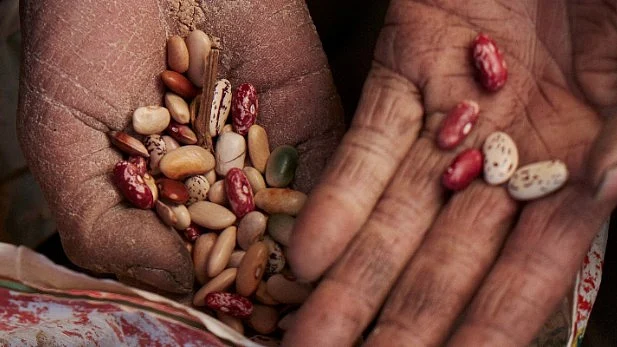Tribal women stood lined with lathis and made their intention clear to the forest department in a small village in the forested hills of Rayagada, Odisha. The forest department wanted them to replant eucalyptus trees in the area which would be profitable for them and the village. But the women instead insisted on planting their native millets that have no economic benefits at the moment. How do we explain this?
Let’s rewind to the Green Revolution which introduced high yielding varieties of seeds. These seeds sowed a shiny new future and welcomed modern agriculture with irrigation, chemical pesticides and fertilizers. While expanding agriculture was necessary to feed an ever-growing population, there is a lot we don’t learn about the Green Revolution in our textbooks.
Unplanned and excessive irrigation has reduced our water table to a very dangerous level and chemicals from pesticides and fertilizers have seeped through our soil, water, food and bodies causing chronic diseases. Further, these seeds are patented and place a substantial financial burden on farmers. The effects of this transition can be felt at many different levels. One relatively underrepresented factor was the loss of thousands of indigenous seeds.
Women in Raygada decided to reverse this process. They refused to replant the eucalyptus which degraded the soil and prevented any other plants from growing near it. Instead, they wanted to plant their local millets. Like all indigenous seeds, these have been through centuries of adaptations to the local environment and do not require the high quantities of water and pesticides that the high yielding varieties do.
This helps the farmers economically and the environment to recover and regenerate naturally. In this area about 6,000 families have come together and planted 10-15 trees each to regenerate the forest which will now meet the needs of their future generation for nutrition and sustenance.
Similar movements are sprouting in different parts of the country. In the Terai of Uttrakhand, the ‘Beej Bachao Andolan’ focusses on agriculture through traditional practices and seeds. Kunwar Prasson of the Andolan says “There were over 3,000 varieties of wheat in Garhwal before the Green Revolution. Now these are down to 320. Incidentally, many of our indigenous seeds yield more in fewer days than the high yield variety of seeds. Like the Gorakhpuri Paddy of Tehri takes 95 days to harvest and yields 35-40 quintals per hectare."
These seeds are also healthier because they are much easier to grow organically and add to the diversification of nutrients needed in a balanced diet. Uttarakhand, for example, is marketing itself as an organic state.
Meanwhile Tamil Nadu’s R Jayaraman is a farmer who has helped to revive 153 varieties of rice. All of them are organically grown and he explains which variety is better for heart patients, which for pregnant women and which is rich in antioxidants. All, he says, are more nutritious and cheaper than their chemical-guzzling, hybrid counterparts.
In this way communities are growing saplings to revive nutrition, culture, environment and economy. Our challenges in the coming years will be to discern when to introduce new technology and when to appreciate and enhance what is worth preserving.
(Nandini Mehrotra is a regular environment contributor for The Quint. The views expressed above are the author’s own. The Quint neither endorses nor is responsible for the same.)
